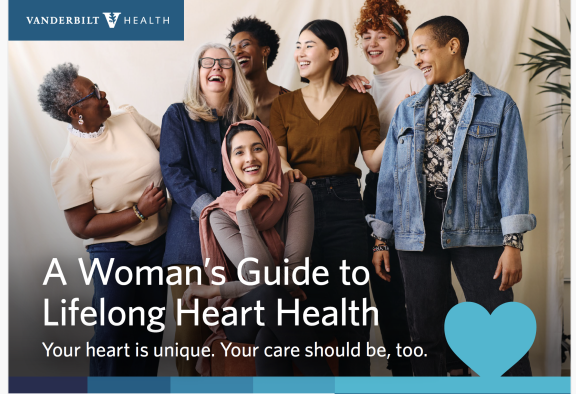Heart disease remains the leading cause of death among women, yet awareness and proactive care can significantly change outcomes.
According to Kathryn Lindley, MD, director of the Vanderbilt Women’s Heart Center, addressing cardiovascular risks unique to each life stage can help women take better control of their heart health. Here is some of her guidance to share with your employees and their families.
Reproductive Age
It's important to eat a balanced diet including fruits, vegetables, whole grains, lean meats and low-fat diary, and exercise three days a week. Regularly check blood pressure (normal is less than 120/80) and blood sugar.
Dr. Lindley also stressed the impact that early cholesterol checks can have in the long term. “You would be surprised at the number of 40-year-old women that I see who have never had their cholesterol checked,” she said. “There’s been years of untreated cholesterol that has accumulated and increased their risk.”
Pregnancy
According to Dr. Lindley, 20% of all deliveries at VUMC are complicated by hypertension. Blood pressure of less than 140/90 in pregnancy is normal. To help keep it controlled, gain a healthy amount of weight during pregnancy. The rule of thumb: It’s okay to gain 25-30 lbs if you are of normal weight, 15-25 lbs if you are overweight, and 11-20 lbs if you are obese.
Also, exercising helps normalize blood pressure. Pregnant women should talk to their doctor about the benefits from taking a low-dose aspirin to prevent preeclampsia.
Postpartum
Regularly monitor blood pressure especially in the first two weeks after having a baby. Work towards returning to pre-pregnancy weight after one year, and resume exercise at least three days per week 6-12 weeks after delivery.
Pregnancy complications such as gestational diabetes, preeclampsia and preterm birth increase the risk for future heart conditions, so have your cholesterol and blood sugar screened after delivery.
Perimenopause
Continue to track cardiac risk factors such as blood pressure, cholesterol, blood sugar and weight, and have lab tests taken every 3-5 years.
Dr. Lindley recommends a mixture of aerobic and weight-bearing exercise three days per week. as well as a heart-healthy diet. Consider a coronary calcium screening to determine risk.
Menopause and Postmenopause
“We typically see a big inflection in risk when women go through menopause, which typically occurs around 51,” Dr. Lindley explains. “That’s when blood pressure, blood cholesterol, weight and blood sugar all start to go up.” It’s important to stay active, eat a heart-healthy diet and check blood pressure regularly.
Atrial fibrillation (AFib) is another heart rhythm disorder that becomes more common as women age. Women who notice irregular heartbeats, dizziness or shortness of breath should talk to their doctor. Some employers offer the benefit of Vanderbilt's MyHeartHealth Bundle to treat AFib and other cardiac arrhythmias. Learn more about that program at this link.
Hypertension: The Silent Killer
Dr. Lindley places particular emphasis on monitoring blood pressure in all stages. It’s the leading cause of maternal deaths and hospital readmissions in Tennessee and a major cause of morbidity. “For some patients, hypertension can start as early as their teens or 20s, and it really tends to accelerate during the menopausal years,” she explained.
The good news: There are highly effective ways to treat high blood pressure. “But we can’t treat it if we don’t know about it,” she said.
Additional Resources
Find more information in A Woman’s Guide to Lifelong Heart Health, a handy checklist of healthy lifestyle choices throughout the lifespan. And review My Vanderbilt Health’s collection of articles on the symptoms of heart disease in women, how to mitigate risk factors, and heart-healthy diet and lifestyle modifications.
